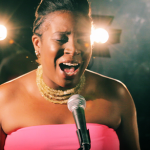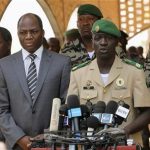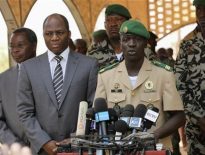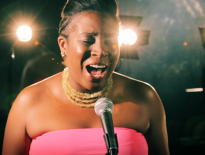By Christian Lowe and Lamine Chikhi
ALGIERS
(Reuters) – Algeria on Friday declared its ruling party for the past 50 years the victor in a
parliamentary election, going against the tide of the “Arab Spring” which has transformed its
neighbours.
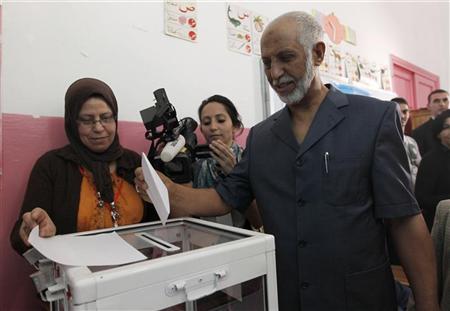
National Liberation Front (FLN) leader Abdelaziz Belkhadem casts his ballot during parliamentary
elections at a polling station in Algiers May 10, 2012. REUTERS/Louafi Larbi
The governing elite in Algeria, which supplies about a fifth of Europe’s
imported natural gas, had promised reform and a new generation of leaders in response to last year’s
upheavals in the region, but the election preserved the status quo.
Interior Minister Daho Ould
Kablia, who oversaw Thursday’s election, said the National Liberation Front (FLN) would be the biggest
party in the new parliament, with 220 of the 462 seats.
The FLN was the movement which fought
for independence from French colonial rule and has been at the heart of power in Algeria ever
since.
“There is no change,” political analyst and writer Abed Charef told Reuters. “Algeria has
invented the force of inertia.”
The official results showed that the FLN, whose honorary head is
President Abdelaziz Bouteflika, had increased its share of seats to 47 percent from 34
percent.
Second place went to the National Democratic Rally (RND), with 68 seats. The RND is led
by Prime Minister Ahmed Ouyahia and was in second place to the FLN in the outgoing
parliament.
The Green Algeria alliance, a grouping of moderate Islamist parties with links to
the ruling establishment, was in third place with 48 seats.
In fourth was the secularist Front
of Socialist Forces, Algeria’s oldest opposition group, which ended over a decade of boycotts to run
in the election.
The Interior Minister said people had chosen to back the FLN because it was a
party they knew, and which offered a safe “refuge” from the turmoil in the region.
“The election
has reinforced the Algerian people’s attachment to the values of peace and stability,” Interior
Minister Ould Kablia told a news conference. “If the people have chosen the same parties who were in
the previous parliament, it is their right to choose.”
ISOLATED
The result leaves Algeria
the odd man out in North Africa. Egypt, Libya and Tunisia all have had revolutions that ousted
autocratic leaders, while Morocco, Algeria’s neighbour to the west, now has an Islamist former
opposition leader as its prime minister.
The insurrections in the region last year prompted
calls for Algeria to embrace democracy more completely and to renew an establishment that has run the
country without interruption since independence from France in 1962.
Yet it was clear the
election was not a clean break from the past. More than half of eligible voters abstained, with many
saying they had no faith there would be real change. Seventeen percent of ballots were spoiled or
invalid.
Many believe real power lies with an informal network commonly known by the French term
“le pouvoir”, or “the power”, which is unelected, has been around for years and has its roots in the
security forces. Officials deny such a network exists.
Despite the apathy, there is little
appetite for a revolt.
The country is still emerging from a conflict in the 1990s between
security forces and Islamist insurgents, which killed an estimated 200,000 people. Few people want any
radical change that could tip Algeria back into violence.
President Abdelaziz Bouteflika, 75, is
likely to exercise his prerogative to appoint a new prime minister after the election. The victory
makes FLN leader Abdelaziz Belkhadem, who has already served once as prime minister, a leading
candidate for the job.
“The next prime minister should be Abdelaziz Belkhadem, the big winner of
the legislative elections, but little if no change at all is expected in Algeria’s political scene,”
said Farid Alilat, a political analyst and editor of online news portal DNA.
Algerians who had
hoped the “Arab Spring” would lead to reform in their country were scornful of the
election.
Yacine Zaid, a human rights activist and critic of the ruling elite, called the
election “a masquerade, a circus … The authorities have always dared to do what they want, to give
whatever figures are in their head.”
However, European Union vote monitors said the organisation
of the vote was satisfactory. “Citizens were, in general, able to truly exercise their right to vote,”
said Jose Ignacio Salafranca, head of the EU observer mission.
Attention is likely to turn now
to the race to succeed Bouteflika, who is frail and is not expected to run again when his term ends in
2014. Under Algeria’s constitution, the president has much more power than parliament.


